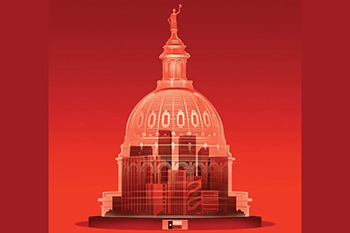Preemption
Bill Sponsors / Authors:
![]() Rep. Dustin Burrows
Rep. Dustin Burrows
R - Lubbock
![]() Sen. Brandon Creighton
Sen. Brandon Creighton
R - Conroe
Supporting Documents / Links:
- Judge Rules HB 2127 Unconstitutional
COH Press Release - August 30, 2023 - City of Houston Petition Challenging HB 2127
July 3, 2023 - Texas legislature could strip cities of local authority
The Hill - March 9, 2023 - Collyn Peddie Oral Testimony
March 15, 2023 - Some Republicans raise questions about push by Chair Burrows to broadly preempt local government, concerns emerge about protections for payday lenders
Quorum Report - March 15, 2023 - Collyn Peddie against SB 814
April 4, 2023 - How the Texas GOP Became the Party of Big Government
Texas Monthly - May 2023 - A “Death Star bill” aimed at overriding a wide range of local government control powers is likely to pass the Senate
Houston Public Media - May 3, 2023 - ‘Death Star’ preemption bills threaten Houston leaders’ power to govern
Houston Chronicle - May 5, 2023 - Texas Republicans ended a patchwork of local rules they say hurt business. They also eroded powers of city councils.
Texas Tribune - June 7, 2023
 House Bill 2127 - Death Star Preemption
House Bill 2127 - Death Star Preemption
The Texas Constitution, in Article XI, Section 5, grants the power of local self-government to a home-rule city. A home-rule city may act in a way that is authorized by its charter. However, that charter may not contain any provision inconsistent with the Texas Constitution or state law.
This is the opposite of a general law city, which must look to state law for the authority to act. The threshold for general law cities to adopt city charters and become home rule cities occurs when the population hits 5,000 inhabitants.
House Bill 2127 purports to preempt all local regulation under Texas’ Agriculture, Finance, Insurance, Labor, Natural Resources, Property, Business and Commerce, and Occupations Codes unless “explicitly” authorized by the Legislature.
The bill expressly attempts to convert home-rule into general law cities for matters associated with these codes.
In recent years, the Legislature has not been shy about specifically preempting city ordinances that it feels are better regulated by the State. Examples include Laredo’s plastic bag ban, Denton’s ban on fracking in the city limits, and Houston’s local ordinances regulating concrete batch plants.
To preempt a subject matter, the Legislature must do so with “unmistakable clarity.”
In the examples above, changes in state law were clear with regards to the preemption of these local regulations. House Bill 2127 does not provide that same level of clarity. Rep. Dustin Burrows of Lubbock admitted as much during his testimony before the House State Affairs Committee when laying out the bill:
“We could sit there and try to be prescriptive and identify each and everything that we are preempting,” Burrows said. “This bill is designed to be somewhat of a living document.”
The City currently has a number of laws involving regulatory programs that could be impacted by the scope HB 2127. For example, the Occupations Code includes state statutes concerning consequences of criminal convictions (Chp. 53), outdoor music festivals (Chp. 2104), regulation of fireworks (Chp. 2154), boarding homes (Chp. 2155), and vehicle towing and booting (Chp. 2308).
Along with the State of Texas, the City of Houston regulates the business practices of tow truck drivers, storage lots, and tow truck companies, some of whom engage in predatory business practices. There are currently 817 incident management and private property wrecker drivers within our corporate limits, with approximately 270 tow companies and 120 storage lots.
The City’s background checks are more stringent than those required by the State law because of concerns for the safety and welfare of vulnerable drivers left stranded on our thoroughfares.
The Occupation Code caps the state license at $15, while the City of Houston charges $99.25 to perform a criminal background check.
Because of these stricter standards, Houston has identified and denied applicants for tow truck driver licenses whose criminal backgrounds included convictions for multiple DWIs; robbery; rape; aggravated assault; and felony theft.
Is it the intention of the State of Texas to now take over the licensing of Houston tow truck drivers? This is but one example in a myriad of local regulations that were designed and passed by local governments to address concerns. If the Legislature wants to preempt these, they should do so with clarity.
Had they wished for the State to completely control local activities, the framers would not have adopted home-rule and would, instead, have included a Supremacy Clause in the Texas Constitution.
They did not.
By eliminating local governments’ ability not just to innovate but to regulate at all in certain areas, even when the State itself does not regulate heavily or at all and there is no regulatory conflict, House Bill 2127 expressly and unconstitutionally thwarts the framers’ designs for local governments. House Bill 2127 reportedly eliminates the “patchwork” of local regulations when in actually it shreds the ability of local governments to act.
The long-standing, carefully constructed, constitutional balance between the regulatory authority of the State of Texas and that of home-rules cities will collapse under this uncertainty.
On July 3rd, the City of Houston filed suit against the State of Texas challenging the constitutionality of HB 2127.